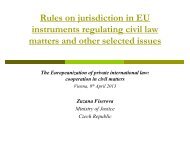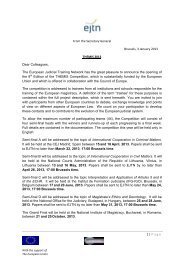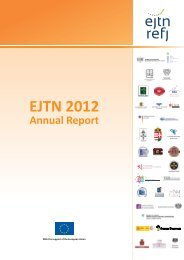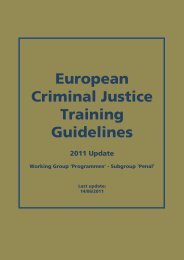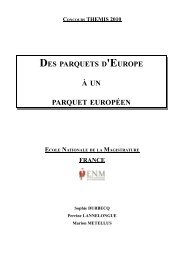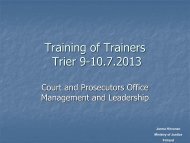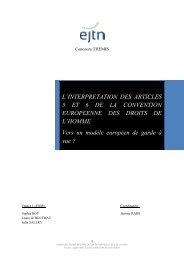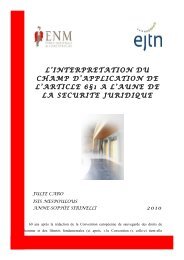Written paper Belgium_1.pdf - European Judicial Training Network
Written paper Belgium_1.pdf - European Judicial Training Network
Written paper Belgium_1.pdf - European Judicial Training Network
Create successful ePaper yourself
Turn your PDF publications into a flip-book with our unique Google optimized e-Paper software.
7.Current government disregards the advice of the High Council of Justice<br />
Despite the aforementioned recommendations of the High Council of Justice we determine<br />
that in <strong>Belgium</strong> the mechanism of secondments to all ministerial cabinets still is applied. Very<br />
recently, in February 2012, the first Minister Elio Di Rupo was questioned about that in<br />
Parliament.<br />
Current occasion was the secondment of tree magistrates on cabinets of the new government.<br />
Two of them working on other cabinets than the ministerial cabinet of the Minister of Justice.<br />
In latter cases, it concerns the General Prosecutor of Liège, Cédric Visart de Bocarmé, who<br />
works with the Minister of Home Affairs Joëlle Milquet (cdH) and Frank Schuermans of the<br />
General Prosecutors Office of Ghent, who is posted to the Minister of Economical Affairs,<br />
Johan Vande Lanotte (spa).<br />
Although posted to a ministerial cabinet (part of the Executive), the magistrate stays both<br />
statutory and deontological a “magistrate” and in principle will regain his old function after<br />
the secondment.<br />
Although since 1996 appointments were objectified through the High Council of Justice, one<br />
can determine that magistrates after their return often are nominated in very prestigious<br />
functions. The border between magistrature and politics shows its edges.<br />
8.De lege ferenda<br />
The attempts up to now to diminish the importance of posted magistrates on ministerial<br />
cabinets, seem to yield few tangible results.<br />
Have the habits of the Executive already changed in this area? We keep finding members of<br />
the Prosecutors Office within the staff functions of the ministerial cabinets. Some may think<br />
that this is a excellent case, because this allows the minister to be optimal informed about the<br />
judicial reality 20 .<br />
This argument isn’t really pertinent considering this information is very fragmented, because<br />
the magistrate only speaks in his own name. Moreover this argument is only applicable in<br />
20 MARCHANDISE, Thierry, ‘Le ministère public et le politique: ordres et désordres’ in “Justice et politique: je<br />
t’aime, moi non plus…”, Larcier, 2009, 104-105.<br />
17



